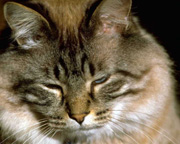| |
 FIV infects all cats from leopards and lions to domestic house cats.
Most at risk for infection are male non-castrated, outdoor cats that
often get in fights with other cats. The virus is spread from cat to
cat by inoculation of virus from the infected cat into the blood of an
uninfected cat. FIV is at very high levels in the saliva of infected
cats so when they bite opponents during a fight they spread the virus. FIV infects all cats from leopards and lions to domestic house cats.
Most at risk for infection are male non-castrated, outdoor cats that
often get in fights with other cats. The virus is spread from cat to
cat by inoculation of virus from the infected cat into the blood of an
uninfected cat. FIV is at very high levels in the saliva of infected
cats so when they bite opponents during a fight they spread the virus.
The most common clinical signs of FIV
infection are:

- oral cavity disease such as severe gingivitis or periodontitis
- upper respiratory disease (runny nose, coughing)
- gastrointestinal disease (diarrhea)
- skin disease (pyoderma or rough coat)
FIV often requires a long time (years) to cause clinical signs and cats
can live for many years with some lifestyle changes.
 If you suspect your cat has FIV, the first step is to take your cat to
the veterinarian and have the cat's blood tested for the presence of
antibody to FIV. Many veterinarians have FIV Rapid Test kits at their
clinic and can have initial results for you in 30 minutes or less. If
the initial FIV screening test comes up positive, the next step is to
send a sample of your cat's blood to a reference diagnostic laboratory
for a confirmation test. If you get a positive back on the confirmation test
you will have to decide to make some lifestyle changes for your cat and
most likely yourselves. If you suspect your cat has FIV, the first step is to take your cat to
the veterinarian and have the cat's blood tested for the presence of
antibody to FIV. Many veterinarians have FIV Rapid Test kits at their
clinic and can have initial results for you in 30 minutes or less. If
the initial FIV screening test comes up positive, the next step is to
send a sample of your cat's blood to a reference diagnostic laboratory
for a confirmation test. If you get a positive back on the confirmation test
you will have to decide to make some lifestyle changes for your cat and
most likely yourselves.
 FIV infected cats present a potential risk to
other cats so the first thing to do is to make sure your FIV cat becomes
strictly an indoor cat. This will benefit your neighbors' cats but it
will also help your cat. By reducing the stress on your cat's immune
system (no more fights, no more defending territory, routine mealtime
with healthy food, less exposure to other viruses and bacteria) your cat
will actually live longer and healthier. I know of cats that have lived
long, (8 to 12 years) relatively healthy lives after being diagnosed
with FIV. To my knowledge, there is no specific treatment for FIV--just
treat your cats symptomatically as problems occur. At the present time
there are no effective vaccines available. FIV infected cats present a potential risk to
other cats so the first thing to do is to make sure your FIV cat becomes
strictly an indoor cat. This will benefit your neighbors' cats but it
will also help your cat. By reducing the stress on your cat's immune
system (no more fights, no more defending territory, routine mealtime
with healthy food, less exposure to other viruses and bacteria) your cat
will actually live longer and healthier. I know of cats that have lived
long, (8 to 12 years) relatively healthy lives after being diagnosed
with FIV. To my knowledge, there is no specific treatment for FIV--just
treat your cats symptomatically as problems occur. At the present time
there are no effective vaccines available.
 I hope this information is helpful. If you still have questions please
contact your veterinarian. Free veterinary advice on the web is available from Dr. Sue at www.vme.net/dvm/DrSue. I hope this information is helpful. If you still have questions please
contact your veterinarian. Free veterinary advice on the web is available from Dr. Sue at www.vme.net/dvm/DrSue.
VME, Inc.
|
|
 FIV infects all cats from leopards and lions to domestic house cats.
Most at risk for infection are male non-castrated, outdoor cats that
often get in fights with other cats. The virus is spread from cat to
cat by inoculation of virus from the infected cat into the blood of an
uninfected cat. FIV is at very high levels in the saliva of infected
cats so when they bite opponents during a fight they spread the virus.
FIV infects all cats from leopards and lions to domestic house cats.
Most at risk for infection are male non-castrated, outdoor cats that
often get in fights with other cats. The virus is spread from cat to
cat by inoculation of virus from the infected cat into the blood of an
uninfected cat. FIV is at very high levels in the saliva of infected
cats so when they bite opponents during a fight they spread the virus.